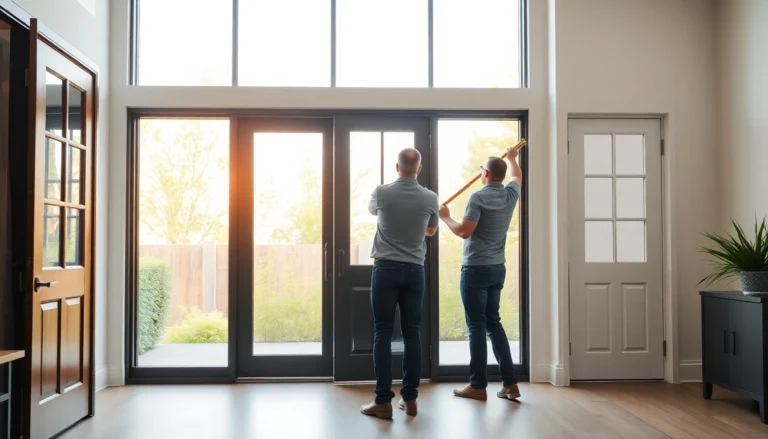
Understanding the Role of a Siding Contractor
When it comes to enhancing the exterior appearance, durability, and insulation of your home, the importance of hiring a qualified siding contractor cannot be overstated. A siding contractor specializes in the installation, repair, and maintenance of a variety of siding materials, ensuring your home’s exterior withstands weather elements while projecting curb appeal. This detailed guide will delve into what a siding contractor does, the types of siding materials available, and why entrusting your project to a professional leads to optimal results.
What Does a Siding Contractor Do?
A siding contractor is a trained expert who manages every aspect of siding projects—from initial assessment to the final inspection. Their primary responsibilities include evaluating the structural integrity of your home’s exterior, recommending appropriate siding options based on your budget and style preferences, sourcing high-quality materials, and executing installation with precision. Besides installation, siding contractors conduct repairs on damaged or worn-out siding, which helps prolong the lifespan of your exterior and maintain its protective functions.
They also handle surface preparation, ensuring that the underlying structure is clean, level, and free of issues like mold, rot, or pests before applying new siding. Skilled contractors manage project timelines, coordinate with suppliers, and ensure adherence to local building codes and safety standards. An experienced siding contractor also offers valuable advice on maintenance techniques and long-term care to maximize the lifespan of your siding investment.
Types of Siding Materials Offered
Modern siding options come in a diverse range of materials, each with unique benefits, aesthetic qualities, and cost considerations. Here are some of the most popular siding materials that reputable siding contractors offer:
- Vinyl Siding: Widely favored for its affordability, variety of styles, and low maintenance requirements. Vinyl siding resists pests and rot, making it a durable choice for many homeowners.
- Cedar Siding: A natural wood option that provides a warm, timeless look. Cedar is highly aesthetic but requires regular upkeep to prevent weathering and insect issues.
- Fiber Cement (e.g., James Hardie): Known for its durability and fire resistance, fiber cement siding can mimic wood or stucco while resisting pests, moisture, and rot.
- Metal Siding: Usually made of aluminum or steel, metal siding offers excellent longevity and a sleek, modern appearance. It’s also resistant to fire and pests.
- Stucco: A classic, textured finish primarily used in warmer climates. Stucco provides excellent insulation and weather resistance but requires skilled installation.
- Synthetic Products: Materials like engineered wood or composite sidings offer durability with less maintenance, often mimicking the appearance of natural materials at a lower cost.
Selecting the right siding material depends on factors such as climate, home style, budget, and maintenance willingness. An experienced siding contractor can guide homeowners through these choices, ensuring alignment with long-term expectations.
Why Hire a Professional Siding Contractor?
While DIY approaches may appeal to some homeowners, professional siding installation offers numerous advantages that significantly outweigh the potential savings. Expert contractors bring technical knowledge, experience, and access to high-quality tools, resulting in cleaner work and fewer issues down the line. Proper installation is critical for siding to perform its intended functions, including insulation, protection, and aesthetics.
A licensed contractor ensures compliance with local building codes, safety standards, and manufacturer warranties. They also minimize the risk of costly mistakes such as improper sealing, inadequate fastening, or surface preparation errors. Moreover, reputable contractors often offer warranties on their workmanship, providing peace of mind and assurance of lasting quality.
How to Choose the Right Siding Contractor
Key Factors to Consider
Selecting a suitable siding contractor involves evaluating several critical factors:
- Credentials and Licensing: Verify that the contractor holds appropriate licenses and insurance to protect against liability and ensure adherence to industry standards.
- Experience and Portfolio: Look for contractors with extensive experience and a portfolio of completed projects similar to yours.
- Reputation and Reviews: Check online reviews, ratings, and testimonials from previous clients. Trusted platforms like Angi, Houzz, or Yelp can provide insights into their reputation.
- Material Options and Expertise: Ensure the contractor is proficient with your desired siding materials and provides expert recommendations.
- Warranty and Post-Installation Support: Confirm that they offer warranties on both materials and workmanship, indicating confidence in their service quality.
Questions to Ask During Consultation
To gauge the professionalism and suitability of potential contractors, consider asking:
- Can you provide references from recent clients?
- What materials do you recommend for my specific needs and why?
- What steps will you take to prepare my home’s exterior?
- How long will the project take from start to finish?
- Do you handle permits and inspections myself or will I need to arrange them?
- What warranties do you offer on labor and materials?
Evaluating Quotes and Estimates
Price is an important factor but should not be the sole criterion. Request detailed estimates that include breakdowns of material costs, labor, permits, and contingency allowances. Compare not only prices but also the scope of work, timeline, and warranty coverage. Be wary of significantly lower bids — they may indicate compromised quality or hidden costs. A transparent, comprehensive quote reflects professionalism and clear understanding of your project requirements.
Best Practices for Siding Installation and Repair
Preparation and Surface Assessment
Proper siding installation begins with meticulous surface preparation. The contractor should inspect the existing sheathing, check for rot, mold, pests, or structural deficiencies, and address these issues prior to siding application. Surfaces must be clean, dry, and properly vented. For instance, installing siding over damp or uneven surfaces can lead to blistering, warping, or premature failure.
Proper Installation Techniques
Correct installation involves aligning panels accurately, using appropriate fasteners, and allowing for expansion and contraction. Modern siding materials expand and contract with temperature fluctuations; therefore, installers should leave gaps or utilize specific fastening methods. Sealants, flashing, and weather-resistant barriers also play vital roles in preventing moisture intrusion, which can cause rot and mold.
For example, James Hardie fiber cement siding requires specific nail spacing and spacing around windows and doors. These technical nuances are best managed by trained professionals following manufacturer guidelines.
Maintenance and Longevity Tips
To maximize the lifespan of siding, regular maintenance is essential. This includes periodic cleaning with mild soap and water, inspecting for damage after storms, sealing or repainting wood sidings, and addressing issues promptly. For vinyl and fiber cement sidings, removal of debris and checking for cracks can prevent water infiltration. A professional siding contractor can provide personalized maintenance schedules tailored to your material and climate.
Cost Factors and Budgeting for Siding Projects
Average Pricing by Material Type
Understanding typical costs helps in effective budget planning. According to current data, the average costs for common siding materials are:
- Vinyl Siding: $2.50 to $10.75 per square foot
- Cedar Siding: $5 to $12 per square foot, depending on quality and style
- Fiber Cement (James Hardie): $10 to $13 per square foot
- Metal Siding: $8 to $20 per square foot
For a typical 2,000-square-foot home, total costs can range from approximately $10,000 for vinyl to over $40,000 for premium fiber cement or metal siding, including installation.
Factors Affecting Project Costs
Several variables influence the final expense of a siding project:
- Material Type and Quality: Premium materials cost more upfront but offer enhanced durability and aesthetics.
- Home Size and Complexity: Larger and more complex facades with multiple stories, intricate trim, or difficult access increase labor costs.
- Surface Condition: Repairs or surface preparation may add to total costs if the underlying sheathing is compromised.
- Location and Accessibility: Urban settings or homes with limited access may require specialized equipment, raising expenses.
- Project Scope: Complete siding replacement differs in cost from targeted repairs or upgrades.
Tips for Cost-Effective Siding Solutions
To optimize your budget without sacrificing quality:
- Choose durable yet affordable materials like high-quality vinyl or engineered wood.
- Plan for phased projects if budget constraints require it.
- Obtain multiple quotes from reputable contractors for comparison.
- Schedule work during off-peak seasons to capitalize on discounts.
- Invest in proper surface prep and installation techniques to prevent costly future repairs.
Overcoming Common Challenges in Siding Projects
Dealing with Weather Delays
Weather is a significant factor impacting siding projects. Rain, high humidity, or extreme temperatures can delay installation, compromise materials, or induce defects like warping. To mitigate these issues, professional contractors plan schedules around favorable weather forecasts, install temporary weatherproofing when possible, and select weather-appropriate materials. Maintaining flexibility in project timelines ensures quality work and avoids rushed or subpar installation.
Ensuring Quality and Compliance
Achieving high-quality siding installation demands strict adherence to manufacturer specifications and local building codes. This includes proper nailing patterns, ventilation, allowance for thermal expansion, and moisture barriers. Regular inspections during each project phase can identify and correct deviations early. Employing certified installers and sourcing materials from reputable suppliers minimizes risks and guarantees compliance, prolonging your siding’s performance.
Post-Installation Inspections and Guarantees
Once installation concludes, a thorough inspection ensures all components meet quality standards. Verify that flashings, seals, and overlaps are correctly placed, and check for potential issues. Reputable contractors offer warranties that cover both materials and labor—typically ranging from several years to a lifetime, depending on the material. These warranties safeguard your investment, providing peace of mind and access to repairs if problems emerge.





